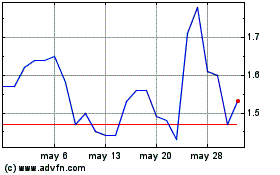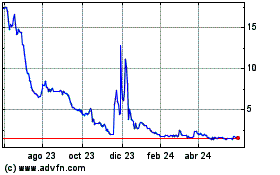Altamira Therapeutics’ Peptide-Based Delivery Platform Shown to Enhance Potency of Commonly Used Gene Delivery Method as Published in Peer-Reviewed Journal
07 Febrero 2024 - 7:47AM

- Independent peer-reviewed study shows enhanced cell
transduction with adeno-associated virus (AAV) vectors, commonly
used in gene therapy, when integrating Altamira’s peptide-based
delivery technology
- Increased potency may help to reduce AAV immunogenicity and
resistance to AAVs in certain cell types
HAMILTON, BERMUDA, Feb. 7, 2024 -- Altamira
Therapeutics Ltd. (Nasdaq: CYTO) ("Altamira" or the
"Company"), a company providing nanoparticle-based technology for
efficient RNA delivery to extrahepatic targets, announced today the
publication of a peer-reviewed article in the Journal of
Integrative Medicine titled, "Melittin analog p5RHH enhances
recombinant adeno-associated virus transduction efficiency". This
work evaluates the use of various peptides to enhance
adeno-associated virus (AAV) cell transduction and was conducted by
an independent research group.1 Recombinant AAVs are commonly used
as carriers to introduce nucleic acids in cells for gene therapy;
several AAV-based gene therapy drugs have already been approved by
the U.S. Food and Drug Administration (FDA).
The study sought to find ways of increasing the
endosomal release of AAV-based therapeutics by using peptides
derived from melittin, a component of bee venom known for its
ability to permeabilize biological membranes. The research group
evaluated 76 melittin derivatives, including p5RHH, the peptide
underlying Altamira’s OligoPhore™ / SemaPhore™ nanoparticle
platform for RNA delivery. The scientists discovered that insertion
of p5RHH into the AAV vector (p5RHH-rAAV) not only enhanced cell
transduction, but also succeeded in transducing cell lines
typically considered resistant to AAVs. Further, an in vivo study
in mice showed that the addition of p5RHH to the AAV capsid of
several AAV serotypes significantly enhanced liver transduction
compared to non-modified AAV vectors, observed up to the last time
point four weeks after systemic administration.
“The study results once again highlight the
strong capability of our technology to promote the release of
nucleic acids from the endosome into the cytoplasm, which has
remained a key limiting factor for both non-viral vectors and
viral-derived delivery vehicles such as AAVs,” commented Covadonga
Pañeda, Ph.D., Altamira Therapeutics’ Chief Operating Officer.
“Better transduction efficiency means that lower doses of AAVs may
be used, which could lower the risk for deleterious immune
responses and increase the safety of AAV-based vectors. In
addition, the integration of the p5RHH peptide into different
serotypes of AAV vectors may open new possibilities in AAV-based
gene therapy in cells and tissues that are not typically amenable
to AVV transduction.”
About Altamira Therapeutics
Altamira Therapeutics (Nasdaq: CYTO) is
developing and supplying peptide-based nanoparticle technologies
for efficient RNA delivery to extrahepatic tissues (OligoPhore™ /
SemaPhore™ platforms). The Company currently has two flagship siRNA
programs using its proprietary delivery technology: AM-401 for KRAS
driven cancer and AM-411 for rheumatoid arthritis, both in
preclinical development beyond in vivo proof of concept. The
versatile delivery platform is also suited for mRNA and other RNA
modalities and made available to pharma or biotech companies
through out-licensing. In addition, Altamira holds a 49% stake
(with additional economic rights) in its commercial-stage legacy
asset Bentrio®, an OTC nasal spray for allergic rhinitis. Further,
the Company is in the process of partnering / divesting its inner
ear legacy assets (AM-125 nasal spray for vertigo; post Phase 2;
Keyzilen® and Sonsuvi® for tinnitus and hearing loss; Phase 3).
Founded in 2003, Altamira is headquartered in Hamilton, Bermuda,
with its main operations in Basel, Switzerland. For more
information, visit: https://altamiratherapeutics.com
Forward-Looking Statements
This press release may contain statements that
constitute "forward-looking statements" within the meaning of
Section 27A of the Securities Act of 1933, as amended, and Section
21E of the Securities Exchange Act of 1934, as amended.
Forward-looking statements are statements other than historical
facts and may include statements that address future operating,
financial or business performance or Altamira’s strategies or
expectations. In some cases, you can identify these statements by
forward-looking words such as "may", "might", "will", "should",
"expects", "plans", "anticipates", "believes", "estimates",
"predicts", "projects", "potential", "outlook" or "continue", or
the negative of these terms or other comparable terminology.
Forward-looking statements are based on management's current
expectations and beliefs and involve significant risks and
uncertainties that could cause actual results, developments and
business decisions to differ materially from those contemplated by
these statements. These risks and uncertainties include, but are
not limited to, the success of strategic transactions, including
licensing or partnering, with respect to Altamira’s legacy assets,
Altamira’s need for and ability to raise substantial additional
funding to continue the development of its product candidates, the
clinical utility of Altamira’s product candidates, the
timing or likelihood of regulatory filings and approvals,
Altamira’s intellectual property position and Altamira’s
financial position, including the impact of any future
acquisitions, dispositions, partnerships, license transactions or
changes to Altamira’s capital structure, including
future securities offerings. These risks and uncertainties also
include, but are not limited to, those described under the caption
"Risk Factors" in Altamira’s Annual Report on Form 20-F
for the year ended December 31, 2022, and in Altamira’s other
filings with the Securities Exchange Commission (“SEC”), which are
available free of charge on the SEC’s website
at: www.sec.gov. Should one or more of these risks or
uncertainties materialize, or should underlying assumptions prove
incorrect, actual results may vary materially from those indicated.
All forward-looking statements and all subsequent written and oral
forward-looking statements attributable to Altamira or to persons
acting on behalf of Altamira are expressly qualified in their
entirety by reference to these risks and uncertainties. You should
not place undue reliance on forward-looking statements.
Forward-looking statements speak only as of the date they are made,
and Altamira does not undertake any obligation to update them in
light of new information, future developments or otherwise, except
as may be required under applicable law.
1 Meng et al. (2024), Melittin analog p5RHH enhances recombinant
adeno-associated virus transduction efficiency, J Integr Med, in
press.
Contact
Investor Contact:
Hear@altamiratherapeutics.com
800-460-0183
Altamira Therapeutics (NASDAQ:CYTO)
Gráfica de Acción Histórica
De Dic 2024 a Ene 2025

Altamira Therapeutics (NASDAQ:CYTO)
Gráfica de Acción Histórica
De Ene 2024 a Ene 2025
